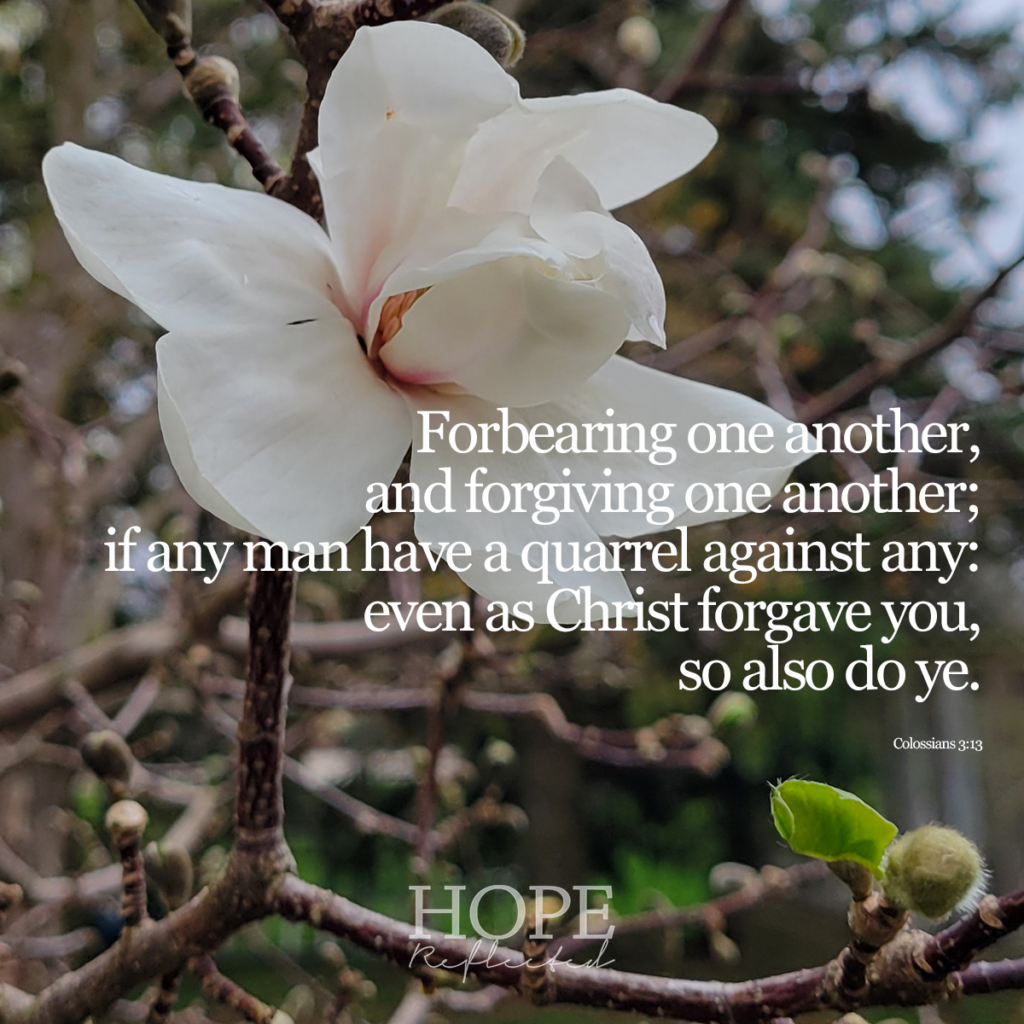An unlikely source
Written by H, Posted in Christian Living, Published Work

“Forbearing one another, and forgiving one another; if any man have a quarrel against any: even as Christ forgave you, so also do ye” (Colossians 3:13).
In his letter to the Church at Colossae, Paul provided admonition to believers because they were falling into error due to false teaching and wrong living. In this verse, Paul provides practical instruction for anyone dealing with present and past wrongs—we are to forbear and to forgive.
Forbearance is an action word.
Like patience and waiting, forbearance is one of those action words that requires us to exercise restraint.
For the creditor, forbearance is the act of refraining from a legal right, like calling in a debt; for the debtor, forbearance is stopping payments or making alternate payment arrangements for a period of time.
A good turn is not just good for you
On his interpretation of “forbearing one another,” (Colossians 3:13), Matthew Henry wrote that “We have all of us something which needs to be borne with, and this is a good reason why we should bear with others in what is disagreeable to us. We need the same good turn from others which we are bound to show them.”
When you’re playing a board game, a good turn is not just good for you; it helps all the players in the game to move forward. And while in life there are certainly times when showing others a good turn is the very last thing that we are inclined to do—especially during the moment after their turn where they’ve just stirred up frustration and strife—forbearing with others is essential to help us move forward.
An act of mercy
I would suggest that forbearance is a kind of human mercy, our attempt at acting out on our small, measly scale the incomparable mercy that God showed us first on the Cross, and continues to show us each day with His unending compassions.
It is in our sinful nature to give someone who has wronged us what they deserve; to return hurtful word for hurtful word, and frustration for frustration. It is not by our own nature that we give a kind word after someone has given us a hurtful word, or that we offer gratification when someone shows us frustration.
Hallmarks of God’s nature
Forbearance and forgiveness are hallmarks of God’s nature.
It’s only through thanksgiving to Him that we can have any part in these actions. As Matthew Henry wrote, “Let the peace of God rule in your hearts; it is of his working in all who are his. Thanksgiving to God, helps to make us agreeable to all men.” All men may not be agreeable to us, but when we give thanks to God, it is possible that we can be agreeable to all men.
Forbearance and forgiveness have their roots in thanksgiving, and yet it seems to us thanksgiving is an unlikely source for such actions, even though we have experienced the greatest act of forgiveness that Christ gave us on the Cross, and the forbearance He shows us every day. He gives to us freely and forever, and forbearance and forgiveness to others is the very least thanks that we can give Him.




![False friends or counterfeit kindness; whatever you want to call it, the world is filled with people who will say one thing to your face and then another behind your back; people who will woo you in order to get something from you.
It’s sad, but it’s true.
The Bible provides us with examples from Joab to Judas, and yet, we’re surprised when we find ourselves deceived and hurt by someone else.
So what are some of the hallmarks of a true friend?
You can read more about this on hopereflected.com [Link in profile]
.
.
.
#friends #friendship #kindness #counterfeitkindness #hurt #proverbs #truefriends #hopereflected #blog #blogpost](https://www.hopereflected.com/wp-content/plugins/instagram-feed/img/placeholder.png)